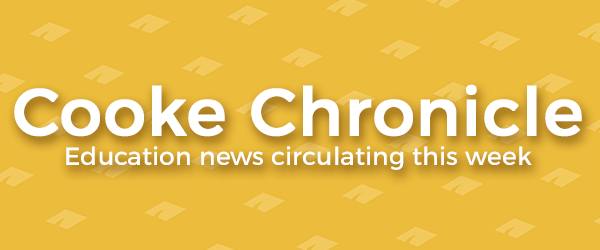Food Insecurity & Financial Aid

April 6, 2018 – Here’s our weekly roundup of education news you may have missed. Separate groups of researchers study food insecurity among children and on college campuses. Emergency grants and improvements to federal financial aid policies are also discussed.
Receive the Cooke Chronicle each week in your inbox: Subscribe here.
Elementary & Secondary Education:
- Children experiencing food insecurity are more aware of their circumstances than many adults might realize, reports Slate. Researchers spoke with children and found that they may try to “help” their families by skipping meals.
- PBS shares some of the viral photos of Oklahoma classrooms on social media. “Given the vital economic significance Americans have placed on education, teachers may be more powerful now than ever before,” writes on Jon Shelton in The Washington Post.
Higher Education:
- “Costs for low-income students can be horrific — even for those with scholarships, student loans and other financial aid,” observes The New York Times.
- “According to a first-of-its-kind survey released Tuesday by researchers at Temple University and the Wisconsin HOPE Lab, 36 percent of students at 66 surveyed colleges and universities do not get enough to eat, and a similar number lack a secure place to live,” states The Washington Post.
- CLASP states that in addition to simplifying the Free Application for Federal Student Aid (FAFSA), policymakers should also discuss “raising the threshold for the automatic zero Expected Family Contribution (EFC).”
- Looking toward the reauthorization of the Higher Education Act (HEA), Diverse: Issues in Higher Education reports on advocates’ recommendations for wraparound student services and improved accountability.
Cooke Foundation Highlights:
- The foundation announced this year’s recipients of the Cooke College Scholarship Program. Each one of these 106 exceptional high school seniors will receive up to $40,000 per year to complete their bachelor’s degree, along with comprehensive college advising.
- “Our goal with the report is to hold up a magnifying glass to state policies and priorities,” Dr. Jonathan Plucker tells Johns Hopkins University’s The Hub. The article covers the findings and recommendations of the Cooke Foundation’s second edition of “Equal Talents, Unequal Opportunities.”
Social Media Spotlight:
THANK YOU JACK KENT COOKE!!! I NO LONGER HAVE TO WAIT FOR MY FINANCIAL AID PACKAGES TO DECIDE ❤️? https://t.co/UCDRsOMIes
— Jenny V. Ha (@jennyvha) April 3, 2018